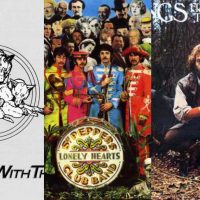2018 marks a significant point in rock ‘n’ roll history: as of this year, 1967’s cultural milestone the Summer of Love is now closer to the end of the First World War than it is to the world of today. In other words, if you aren’t at least 50 years old, the golden age of peace, love and rose colored glasses happened before you were even born, just like so much other ancient history.
And yet classic rock is a dinosaur that still walks the Earth, even if its lizard-footed plod seems to get slower every year. As for its future: maybe it’ll go on in some form or another, or maybe some kind of extinction level event will finally put it to rest.
In any case, there’s still enough life left in the brontosaurus to consider a few points in the twilight of an era.
REVISIONIST ROCK: That great arbiter of knowledge both common and arcane, Wikipedia, states that the heavy metal genre was “developed largely in the United Kingdom” during the late 1960s and early 1970s and three of its most famous pioneers were Led Zeppelin, Black Sabbath and Deep Purple. Maybe so; but has it ever been considered that there might have been a parallel development in the American music scene about the same time? For what it’s worth, consider a few ideas.
Steppenwolf is like Deep Purple in that they’re both five-piece bands with a prominent Hammond organ, and both are often reduced in the greater collective memory to one song apiece (“Born to Be Wild” and “Smoke On the Water,” respectively).
Grand Funk Railroad is the American Black Sabbath, especially considering both bands’ early murky-sounding albums, Tony Iommi’s signature guitar tone mirrored by Mel Schacher’s fuzz bass. And if that doesn’t convince you, each band had a song called “Paranoid” on their second album.
Led Zeppelin is a bit more problematic, but it’s not too far a jump to connect the charisma of the Doors’ frontman Jim Morrison to that of Robert Plant, and the guitar wizardry of Jimi Hendrix to that of Jimmy Page.
I dunno – something to think about.
LIVER THAN YOU’LL EVER BE: It’s pretty amazing how many old rockers are still out on tour in some form or another, and how many of them can still play. Recently, the Steve Miller Band came through town, with Peter Frampton as the opening act. Frampton’s voice is in great shape and he’s such a monster guitar player (yes, he played the talkbox too). Meanwhile, Steve Miller, at age 74, still has his guitar chops as well, and sings the hits just like he did back in the day, even going back to romp through a few cuts from albums he made before “The Joker” boosted him to megastardom. No altered vocal lines, no drop tunings or key changes – kind of like the vocal equivalent of The Picture of Dorian Gray.
REISSUES: In recent years, it’s become the norm for bands to reissue classic albums with remastered or remixed sound and bonus tracks. For instance, Jethro Tull recently reissued the 40th Anniversary Edition of 1978’s Heavy Horses. It’s all a fan would expect: great remix by Steven Wilson, some alternate versions and unreleased cuts, and for those inclined to purchase the box set, live recordings from the accompanying tour.
That’s all good, but I’m starting to wonder: Why don’t old groups just go back to the beginning and release their entire catalog again in chronological order, year after year or whatever? And when they reach the end, they could simply start over again. I mean, isn’t this essentially what results by releasing anniversary editions?
WHAT’S NEW IS ACTUALLY OLD: Yes, there are new albums being released all the time, but more and more it’s hard to tell what it’s all supposed to mean. For instance, by now most people have heard of Greta Van Fleet, a great young band that sometimes bears an uncanny audio resemblance to old Led Zeppelin. Or take Jack White, whose new album Boarding House Reach is so retro that it sounds cutting edge. And finally, consider classic-rock outfit UFO.
Most people, if they remember the band at all, might recall that they featured guitar ace Michael Schenker and that they peaked somewhere back in the ’70s. Surprise! Turns out the band is still soldiering on and has been releasing quality albums well into the 21st century, as recently as last year.
Well, that’s enough of that; time to put the triceratops in the barn for the night. And don’t forget: It’s not a fossil if it still rocks.
- How David Bowie’s ‘The Next Day’ Stripped Away All of the Artifice - March 15, 2023
- Why Deep Purple’s ‘Who Do We Think We Are?’ Deserves Another Listen - January 11, 2023
- In Defense of the Often-Overlooked Mott the Hoople - November 10, 2022




